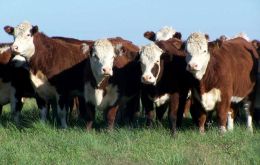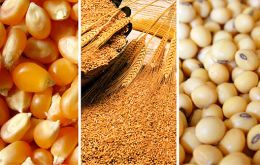MercoPress. South Atlantic News Agency
Tag: argentina economy
-
Tuesday, September 19th 2017 - 09:26 UTC
Argentina rapidly recovering as a world power in beef exports

Argentina, which a century ago became a world power on the back of its beef exports, is poised to re-enter the top 10 shippers, helped by the end of trade curbs, and a herd rebuilding from near-50-year lows.
-
Wednesday, May 24th 2017 - 09:06 UTC
Argentina economy grows 0.8% in March from a year earlier

Argentina's economy grew 0.8% in March from a year earlier, the Indec statistics agency said on Tuesday. The economy also grew 1.9% in March versus February, Indec said.On Tuesday the Argentines central bank also kept its benchmark interest rate at 26.25% and said it believes the country's inflation rate is easing in May.
-
Tuesday, January 17th 2017 - 10:06 UTC
IMF downgrades Latin America prospects because of lesser growth in Brazil and Mexico

The International Monetary Fund has become more pessimistic about Latin America in the January economic outlook update. IMF is now forecasting regional GDP growth of just 1.2% in 2017, down from the 1.6% projection it made in October. It also lowered its 2018 estimate for Latin America by 0.1% to a revised projection of 2.1% expansion.
-
Wednesday, May 27th 2015 - 04:59 UTC
Argentine economic activity up 2% in March, but industrial production down

Good and bad news for Argentina's economy: the latest figures from the National Statistics and Census Institute (INDEC) reveal that economic activity increased 2% percent in March, compared to the same month last year, but industrial production recorded its 21st negative consecutive month in April.
-
Wednesday, October 17th 2012 - 20:34 UTC
Brazil’s slowdown impacts on neighbouring Argentina and Uruguay says Fitch

Brazil's deeper-than-expected economic slowdown is amplifying the deceleration already being experienced by Argentina and Uruguay as a result of the global slowdown, according to a new Fitch Ratings report.
-
Wednesday, August 22nd 2012 - 05:12 UTC
Argentina consumers’ 12-month inflation expectations reach 39.8%

Argentine consumers’ inflation expectations for the next twelve months reached a record of 39.8% climbing for the third month running, according to the latest release from the University of Torcuato Di Tella.
